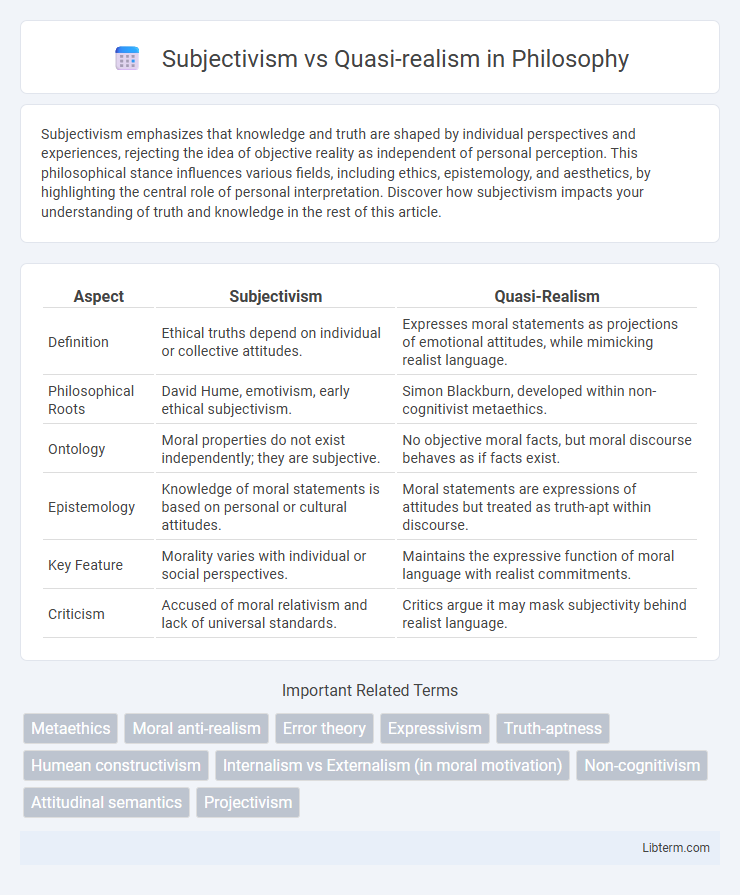Subjectivism emphasizes that knowledge and truth are shaped by individual perspectives and experiences, rejecting the idea of objective reality as independent of personal perception. This philosophical stance influences various fields, including ethics, epistemology, and aesthetics, by highlighting the central role of personal interpretation. Discover how subjectivism impacts your understanding of truth and knowledge in the rest of this article.
Table of Comparison
| Aspect | Subjectivism | Quasi-Realism |
|---|---|---|
| Definition | Ethical truths depend on individual or collective attitudes. | Expresses moral statements as projections of emotional attitudes, while mimicking realist language. |
| Philosophical Roots | David Hume, emotivism, early ethical subjectivism. | Simon Blackburn, developed within non-cognitivist metaethics. |
| Ontology | Moral properties do not exist independently; they are subjective. | No objective moral facts, but moral discourse behaves as if facts exist. |
| Epistemology | Knowledge of moral statements is based on personal or cultural attitudes. | Moral statements are expressions of attitudes but treated as truth-apt within discourse. |
| Key Feature | Morality varies with individual or social perspectives. | Maintains the expressive function of moral language with realist commitments. |
| Criticism | Accused of moral relativism and lack of universal standards. | Critics argue it may mask subjectivity behind realist language. |
Understanding Subjectivism: Core Concepts
Subjectivism asserts that moral judgments express individual attitudes or preferences rather than objective truths, emphasizing the personal nature of ethical evaluations. Central to subjectivism is the idea that moral statements cannot be true or false in an absolute sense but reflect subjective responses, highlighting the diversity of moral perspectives. This contrasts with quasi-realism, which seeks to explain how we talk about moral facts as if they are objective while maintaining that they ultimately derive from subjective attitudes.
Key Principles of Quasi-realism
Quasi-realism asserts that moral statements, while not objectively true, function as if they are truth-apt by expressing emotive attitudes projected onto the world. This theory maintains key principles such as the projection of moral attitudes, the endorsement of moral discourse's objectivity, and the capacity to generate moral facts without metaphysical commitments. By blending expressivism with realist-sounding language, quasi-realism aims to preserve the practical force of morality while rejecting moral realism's ontological claims.
Historical Background: Subjectivism vs Quasi-realism
Subjectivism, rooted in early 20th-century emotivism, posits moral statements express personal attitudes rather than objective facts, influenced by philosophers like A.J. Ayer. Quasi-realism, developed by Simon Blackburn in the late 20th century, aims to explain how moral discourse can mimic objective truth without committing to moral realism. This theory emerged as a middle ground, responding to criticisms of subjectivism by preserving the expressiveness of moral language while avoiding metaphysical commitments.
Meta-Ethical Foundations: Contrasting Approaches
Subjectivism posits that moral judgments are expressions of individual attitudes or emotions, grounding ethical truths in personal or cultural perspectives without independent reality. Quasi-realism, while acknowledging this expressivist basis, aims to mimic the language and structure of realist moral discourse, asserting that moral statements can be treated as objective despite lacking metaphysical substance. The meta-ethical foundation of subjectivism emphasizes internal mental states, whereas quasi-realism seeks to reconcile expressivism with the pragmatic commitments of moral realism.
Moral Language: Expressivism in Focus
Subjectivism posits that moral statements express individual attitudes or emotions, emphasizing internal psychological states as the basis for ethical judgments. Quasi-realism, a development of expressivism, seeks to explain how moral language can appear objective and truth-apt while retaining its foundation in non-cognitive expressions of approval or disapproval. Expressivism highlights the function of moral language as a tool for expressing attitudes rather than stating facts, bridging the gap between subjective emotions and the seemingly factual nature of moral discourse.
The Role of Emotions in Moral Judgments
Subjectivism posits that moral judgments are expressions of individual emotional attitudes, emphasizing the direct influence of personal feelings on ethical evaluations. Quasi-realism, while acknowledging the emotive origins of moral language, seeks to explain how moral statements can possess truth-like qualities without objective moral facts. The role of emotions in both theories underscores their foundational importance, with subjectivism treating emotions as the core of moral meaning and quasi-realism interpreting them as the basis for constructed moral discourse.
Objectivity and Moral Truth: Competing Claims
Subjectivism denies the existence of objective moral truths, asserting that moral judgments express individual or cultural attitudes rather than facts. Quasi-realism aims to explain how moral statements can appear objective and truth-apt while remaining grounded in non-cognitivist attitudes, creating a framework where moral discourse mimics realism without committing to independent moral facts. The competing claims hinge on whether moral objectivity exists independently of human sentiments or is a projection of subjective emotional frameworks.
Strengths and Weaknesses of Subjectivism
Subjectivism's strength lies in its acknowledgment of individual moral perspectives, allowing for cultural diversity and personal autonomy in ethical judgments. However, its primary weakness is the inability to provide a universal standard for resolving moral disagreements, leading to potential moral relativism and inconsistency. This lack of objective grounding can undermine the credibility of moral claims in both personal and societal contexts.
Critiques and Challenges to Quasi-realism
Quasi-realism faces critiques centered on its attempt to explain moral discourse without objective truth, leading to accusations of semantic inconsistency and reliance on subjective attitudes. Critics argue that quasi-realism struggles to account for genuine moral disagreement and the apparent objectivity of ethical claims. Challenges also include difficulties in justifying normative reasons and explaining the persistence of moral intuition beyond mere expressive attitudes.
Implications for Contemporary Ethical Debates
Subjectivism asserts that moral judgments reflect individual attitudes, undermining objective ethical standards and complicating consensus in contemporary debates. Quasi-realism offers a framework that preserves the meaningfulness of moral discourse by treating ethical statements as expressions of commitment without requiring objective truth. This distinction influences discussions on moral disagreement, tolerance, and the possibility of rational ethical debate in pluralistic societies.
Subjectivism Infographic

 libterm.com
libterm.com